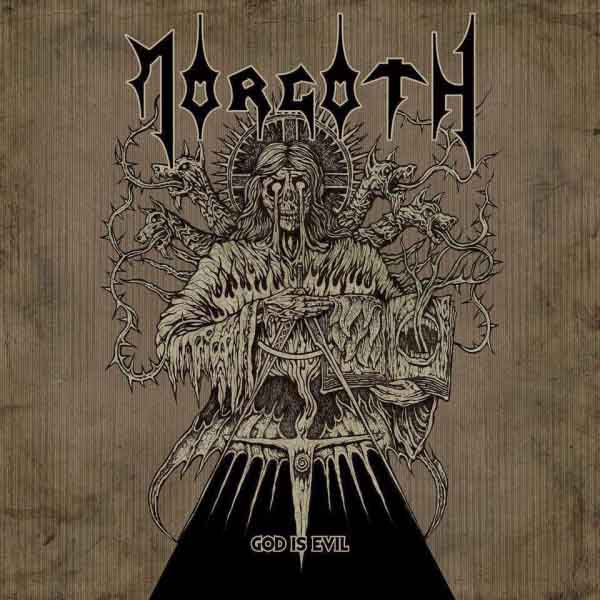Morgoth defined its path in the 1990s with two EPs that combined the American and European death metal sounds, then deviated into a more contemporary sound with Cursed and ultimately Odium, at which point the band lay low for 18 years before returning with God is Evil, an EP of two songs which combine their early years with their middle-period work on Cursed, although the band consciously strives to make the aesthetic identification with the EPs stronger than anything else. That makes sense, since death metal and death metal nostalgia are both big business, with the younger audience wanting to hear the glory years come roaring to life again and the greybeards wanting to re-live some of their fond memories of what death metal meant back then.
“God is Evil” begins with the type of chord progression and accompanying constant double-bass drums that would have kicked off a classic Florida album, maybe Death Spiritual Healing, but with more of a European melodic flair. The Florida influences remained hidden to me until this release, where suddenly the influences from several big Florida bands including Deicide show in the riff rhythm and tempo changes as well as the choice of chord progression used. Death in particular specialized in these kind of storming extended riffs, but much like Death, Morgoth suffers from making the riffs too “pat” or too handily concluding on a symmetrical counterpart to their initiating phrase. The result makes this easy to nod along to. The song develops with slightly more melody in the guitar and some very Tampa downstroke triplet riffing, then fleshes out its theme expertly. This song strikes me as not only very well-done but as reflecting the kind of forward thought that a band can have when they stop worrying about how clear their influences are, and work instead on putting the song together like they would construct a building, engine or electronic gadget: each piece relating to one another with a function or design idea at the center.
“Die As Deceiver” fares slightly worse. Starting with a riff that might have come from “Pull the Plug” with a few modifications, in the same way ground effects make a Honda Civic a race car, this song launches into a series of chant-heavy choruses that require lots of downstroke barrages to create emphasize, before a melodic vocal leading the chorus in the best Destruction style. Then the song breaks into a classic-era Death style transition with more of a hard rock modality to it, then layers this with increasing drum and bass accompaniment before breaking to the original loop. This song sounds hastier or at least more hesitant in that the band clearly builds itself around a couple of tropes but is unclear how they relate outside of rhythm, which creates the impression of a play with the scenes shown in the wrong order. The use of heavy expectation in riff delivery here creates more of a pop influence on this song and makes it less likely to sustain repeated listens. The strained vocals of Mark Grewe attempt to emulate the The Haunted or later At the Gates style and do nothing for the music, because like all “modern metal” (read: lapsed metal) that style leads with vocals and relegates guitar to a sidekick role, at which point it quick becomes more like mainstream rock, which seems to have been the goal. More like the average, more audience. Morgoth shows they do not need to stay current or worry about their influences from the first song but almost seem to have lost confidence on the second and fallen back on crowd-pleaser technique which promptly swallowed up their quality songwriting.
On the whole, God is Evil shows a revitalized Morgoth making a credible attempt at restoring the power of its early years while incorporating some of the musical lessons learned with its more populist albums. My advice to this band is to trust your gut, not your spreadsheets, and focus on writing the music that comes most naturally. Cursed and Odium were the same mistake in opposite directions: trying to be current with the most underground stuff possible, and trying to catch up with the mainstream stuff (which was actually a regression from what death metal had done). These are clearly talented players who, when they let themselves, make amazing death metal that infuses European melody into the charging Florida style.
Tags: century media, death metal, morgoth



Wasn’t this covered before?
They have a new singer now. It’s the guy from Disbelief. He sounds like a mixture of Martin van Drunen and John Tardy.
Apparently this is so, but not on “God is Evil”:
That was sudden. I like the title of the new one, despite it having been used before as the name of a German black metal band.
I know. Just read the news this morning and wanted to share them. As we all know, this version of “God Is Evil” is a few months old. However, the album version will feature Jagger’s vocals. I am looking forward to “Ungod”.
The vocals have degraded to the point where they’re holding the music back. This is also too bouncy. The atmospheric parts in the middle don’t resolve this.
Cursed is a great album. Better than Death or Massacre in the sense that the riffs are more developed and the songs take you places beyond “headbanging”. It probably helps that their music doesn’t follow the same looping A-B-C-solo-A-B-C pattern that’s synonymous with Death. The production was good too with the muffled sound and Black Sabbath guitar tone, it gave it an archaic feeling.